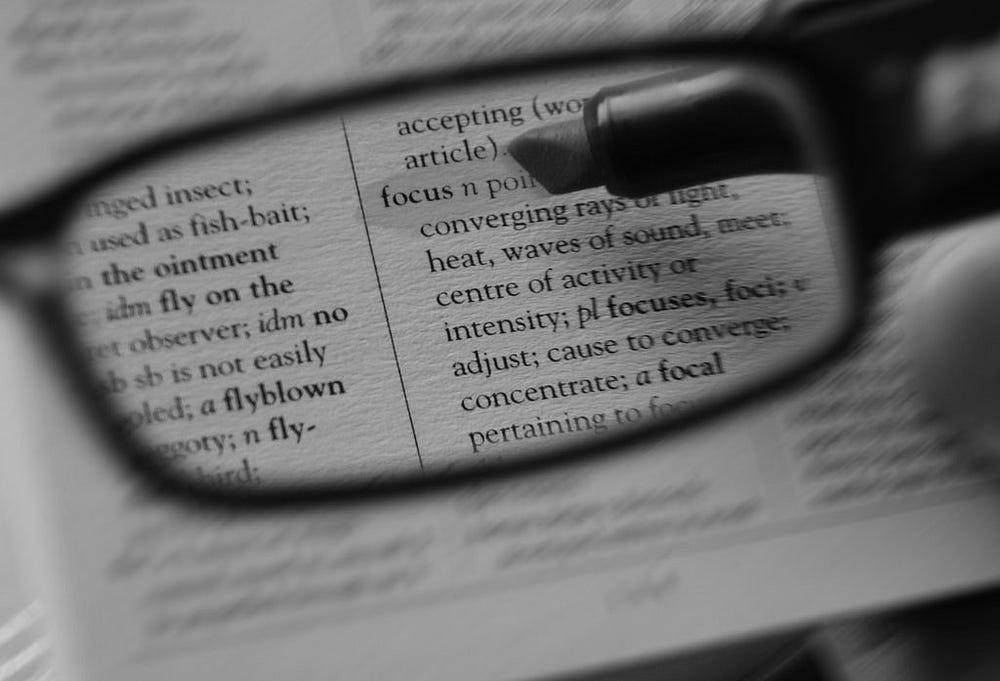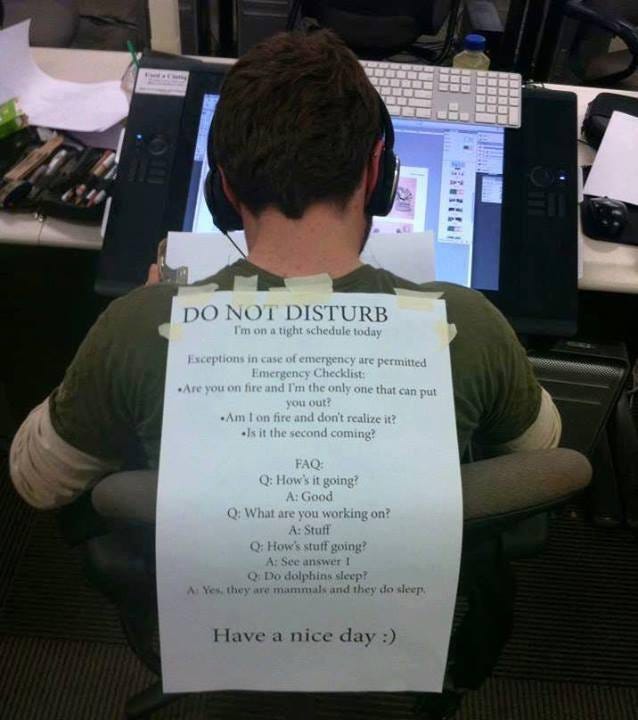
Photo by Mark Hunter
By failing to prepare, you are preparing to fail. - Benjamin Franklin
Recently I read an interesting article about Why do programmers wear headphones?. The truth is that “programmers are easily distracted, headphones eliminate some distractions, thus headphones make programmers.” To reduce losing attention by distractions, I could improve my attention span and control the working environment around myself. But on the other hand, I could lose my attention as well by interruptions, which are usually unexpected. What can I do to deal with them?
Distraction or Interruption?
First of all, what is the difference between distraction and interruption?
A distraction is something that draws one’s attention away from what they are supposed to be paying attention to, entirely unintentionally.[1] For example, when you’re coding, a beautiful/handsome visitor passes by the office, you’re distracted by her/his charm…
An interruption is something that draws one’s attention away from what they are supposed to be paying attention to, entirely on purpose.[1] For example, when you’re coding, a beautiful/handsome visitor comes to your desk and asks you out for a coffee, you’re interrupted by her/his question…
Unintentionally or on purpose, although they all result to draws your attention away, distraction is initiative and interruption is passive.
Prevent interruptions?

image from
₦airaland Forum
Why don’t we just prevent interruptions like preventing distractions? Lock ourself in a room and hang “Do Not Disturb!” sign outside the door? Well, we can isolate ourself by being inside our ideal bubble. But as we know, interruptions are made on purpose, sometimes they provide useful information that we need to adapt the changes:
- An urgent business decision is made, it needs me to discuss and change requirements now.
- An abnormal app crash rate happens in production, it needs me to analyze root cause now.
- A new feature is testable, it needs me to pair testing with developers now.
- …
In these cases, I cannot just simply avoid them, I have to pay attention to handle with them. “Do Not Disturb” could surely gain my focus but I will definitely lose my agility.
Be prepared to embrace interruptions

image from
bryan birdwell
Instead of preventing interruptions, why not be prepared to embrace interruptions? It sounds interesting, right? But how? Pay attention, class! Instruction begins!
1. Continuous Focus and Defocus
Focus makes me efficient, productive. Defocus makes me relax and creative.
Due to human’s natural, we have an attention span: the amount of concentrated time one can spend on a task without becoming distracted. I know my attention span is 30 minutes. It means that I have to switch to defocus state after maximum 30 minutes focus. Even I can force myself focusing. The result will turn into inefficiency and tiredness.
Based on my attention span, similar to Pomodoro technique, I use 25 minutes to focus on one of my tasks and then I give myself 5 minutes break as a reward. After a break, I restart again 25 minutes focusing on a task and then again a 5 minutes defocus…
Imagine if I work for 8 hours, in theory, I have 16 break time. These 16 break time are perfectly prepared for interruptions.
If you’re only short tasks, there is an ultimate version for you, it’s called procrastination hack [2]. Basically, a loop of focus and defocus is shirking to 10+2, then you’ll perform 5 loops in one hour (10+2)*5. So in 8 hours, 40 break time in total!
When interruption comes during my defocus time, without the impact of interruption, I can easily engage myself in other high priority tasks.
Continuous focus and defocus reduce the impact of interruptions.
2. Short Refocus Time
No one can plan his life perfectly. Sometimes when the interruption comes, I’m still focusing on my task! 💩 happens. The reason why people hate interruption so much is not only that interruption draws attention away, but also that it takes a long time to go back to flow. If you could get back to flow in seconds, probably you will feel that interruption is only a kind of annoying, but not really hateful. Therefore, a short refocus time is rather important.
I find a way to gain refocus easily and it works quite well for me. First I will take one deep breath, and then I will cast a magical spell: “What am I doing now?”. By taking a deep breath, I can control my emotion and empty my mind. By questioning myself as a psychological hint, it helps me to focus on the question first, then the focus will be moving back to the task.
By the way, recently I discovered another spell which does the same psychological trick, “I Am One With the Focus and the Focus Is With Me”. But I cannot use that because I cannot resist 😆
A short refocus time reduces the hatred of interruptions.
Interruption is coming!
Speak of the devil and he is sure to appear. Before you finished reading this post, I guess you’ve probably been distracted or interrupted at least once. Take it easy, it’s totally normal. Remember interruption brings changes and challenges on purpose; Remember continuous focus and defocus makes you have more than ease for interruptions; Remember improving refocus time makes you feel comfortable to embrace interruptions.
Brace yourself, interruption is coming!
[1] Distractions and Interruptions… What’s the Difference?
[2] Zeger Van Hese: Testing in the Age of Distraction
